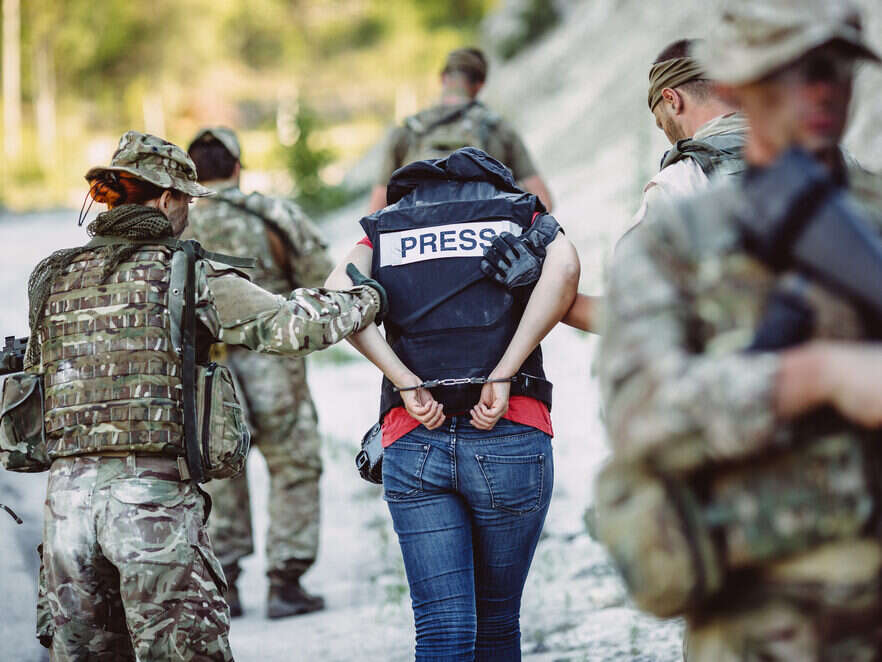
Do journalists deserve legal protection beyond that granted to the general population? For many of us, the instinctive answer is “no”. It is a matter of professional pride and identification with our audience that we do our work by graft and guile, not privileges withheld from others.
There are aspects of reporting, however, that make it wholly unlike other occupations. Plenty of jobs involve exposure to accidental injury – in many cases, unacceptably so. Journalism, however, is the only civilian occupation where significant numbers lose their lives as a result of systematic and deliberate acts.
Around the world, 68 journalists were killed in 2022 – down from the all-time high of 155 in 2016. Assault and imprisonment are even more prevalent.
I reflected on this as I listened to Sir William Patey opine on Radio Four’s Today programme on 17 August. He was discussing the desirability of a state visit to the UK by Mohammed Bin Salman (MBS), the de facto ruler of Saudi Arabia.
Sir William is a career diplomat who, before retirement, served as UK ambassador to such hot spots as Afghanistan, Saudi Arabia, Iraq and Sudan. Bluff operators of his stripe instinctively express a “Foreign Office view”, honed over decades representing the state’s interests overseas.
Nick Robinson put it to the erstwhile diplomat that MBS was widely thought to have ordered the hit on Wall Street Journal columnist Jamal Khashoggi. Surely no British minister would wish to shake such an irredeemably blood-stained hand? Patey’s next two sentences sent a shiver down my spine.
“Saudi Arabia is not the only country that has a track record of killing journalists; they’re amateurs compared with the Turks, the Philippines and others,” he said. “It’s a sad fact that journalists who uncover, who expose, regimes and are critical of regimes are vulnerable.”
There is much in this statement that is troubling – I can’t, for example, recall a state-sanctioned murder like that of Khashoggi’s in either Turkey or the Philippines. It is the underlying attitude that frightens me most, however.
In a few words, the former ambassador reveals a belief in realpolitik that relegates the lives of journalists to expendable currency.
Troublesome reporters are an accepted collateral loss, Patey implies. So long as the bloodshed is not too outlandish, embassy staff will proffer the perpetrators firm handshakes, even if in private they hold their noses. If the media will put themselves in the way of danger, he suggests, they can’t be too surprised if they end up paying a steep price.
‘We should turn up the volume of outrage’
This attitude, unashamedly described by a former senior diplomat, representing a liberal democracy, persuades me of two things.
The first is that as journalists we should turn up the volume of outrage at the prospect of our government rolling out the red carpet for those who murder or are complicit in the murder of our colleagues.
If MBS does come to the UK, no one should be allowed to forget what happened in the Saudi embassy in Istanbul. Likewise, if Israeli politicians visit these shores, then the questions surrounding the death of Shireen Abu Akleh, and other Palestinian journalists, must be sounded with equal volume. Chinese, Iranian and Russian ministers – should they visit – deserve the same noisy disdain.
No less important, we should redouble efforts to pressure the United Nations to adopt a convention to protect journalists.
Such a convention – which my organisation, the International Federation of Journalists, has championed for some years – would spell out what is already implicit in UN Conventions: the right to life, the right to free expression, the right to live by the rule of law and the applicability of law to all. As well as explicitly asserting these rights applicability to journalists, it would irrevocably guarantee civilian protections to journalists in conflict situations.
‘Crucial reminder’ democracy depends on journalists
Asserting rights in this way, explicitly tied to the importance of journalists and journalism, would make it easier to chase down through international institutions those regimes who consider unvetted reporting to be an extinguishable inconvenience.
No less important, such a convention would provide a crucial reminder for the benefit of Sir William Patey and his ilk. Democracy depends on the media every bit as much as it does upon mandarins. Unless state institutions put their full weight behind the rights of journalists to live and work, the edifice of liberal freedoms will crumble.
Would such a convention grant privilege to journalists denied to others? I don’t think so.
Its effect would be to make inalienable rights that are frequently denied. Doing this would recognise that those who expose themselves to the greatest risks deserve an explicit means to hold to account the states that should be the guarantors of their safety. If that ruffles a few diplomatic feathers, so be it.
Email pged@pressgazette.co.uk to point out mistakes, provide story tips or send in a letter for publication on our "Letters Page" blog
